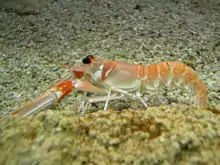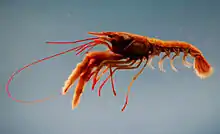Nephrops
Nephrops is a genus of lobsters comprising a single extant species, Nephrops norvegicus (the Norway lobster or Dublin Bay prawn), and several fossil species. It was erected by William Elford Leach in 1814, to accommodate N. norvegicus alone, which had previously been placed in genera such as Cancer, Astacus or Homarus.[1] Nephrops means "kidney eye" and refers to the shape of the animal's compound eye.
| Nephrops | |
|---|---|
 | |
| Nephrops norvegicus | |
| Scientific classification | |
| Kingdom: | Animalia |
| Phylum: | Arthropoda |
| Subphylum: | Crustacea |
| Class: | Malacostraca |
| Order: | Decapoda |
| Family: | Nephropidae |
| Genus: | Nephrops Leach, 1814 |
| Type species | |
| Cancer norvegicus | |
Although the species in the genus Metanephrops were previously included in Nephrops, molecular phylogenetics suggests that the two genera are not sister taxa, Nephrops being more closely related to Homarus than either is to Metanephrops.[2]
Most of the fossil species assigned to the genus Nephrops are known only from partial remains, and their affinities are not certain.[3] They include:
- Nephrops reedi Carter, 1898 – Pliocene, England
- Nephrops costatus Rathbun, 1918 – Pleistocene, Panama
- Nephrops maoensis Rathbun, 1920 – Oligocene or Miocene, Dominican Republic
- Nephrops aequus Rathbun, 1920 – Oligocene or Miocene, Dominican Republic
- Nephrops shastensis Rathbun, 1929 – Cretaceous, California (possibly belongs in Hoploparia)
- Nephrops americanus Rathbun, 1935 – Cretaceous, Texas (not similar to Nephrops or Metanephrops)
References
- William Elford Leach (1830). "Crustaceology". In David Brewster (ed.). The Edinburgh Encyclopaedia. 7. pp. 383–437.
- Tin-Yam Chan; Ka Chai Ho; Chi Pang Li; Ka Hou Chu (2009). "Origin and diversification of the clawed lobster genus Metanephrops (Crustacea: Decapoda: Nephropidae)". Molecular Phylogenetics and Evolution. 50 (3): 411–422. doi:10.1016/j.ympev.2008.11.020. PMID 19070670.
- Richard J. F. Jenkins (1972). "Metanephrops, a new genus of Late Pliocene to Recent lobsters (Decapoda, Nephropidae)". Crustaceana. 22 (2): 161–177. doi:10.1163/156854072X00426. JSTOR 20101873.
